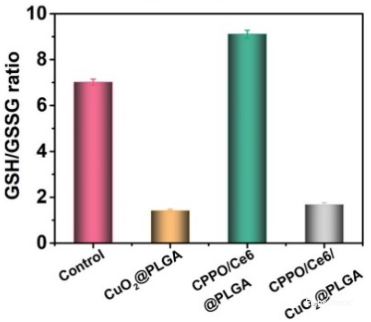Total Glutathione (T-GSH)/Oxidized Glutathione (GSSG) Colorimetric Assay Kit
SKU: E-BC-K097-M-96
To better serve you, we would like to discuss your specific requirement.
Please Contact Us for a quote.
Total Glutathione (T-GSH)/Oxidized Glutathione (GSSG) Colorimetric Assay Kit
| SKU # | E-BC-K097-M |
| Detection Instrument | Microplate reader (405-415 nm, optimum wavelength: 412 nm) |
| Detection Method | Colorimetric method |
Product Details
Properties
| Synonyms | T-GSH,GSSG |
| Sample Type | Serum, plasma, animal tissue, red blood cells, cultured cells |
| Sensitivity | 0.36 μmol/L T-GSH |
| Detection Range | 0.36-30 μmol/L T-GSH |
| Detection Method | Colorimetric method |
| Assay type | Quantitative |
| Assay time | 100 min |
| Precision | Average inter-assay CV: 3.900% | Average intra-assay CV: 0.600% |
| Other instruments required | Micropipettor, Centrifuge, Incubator, Vortex mixer |
| Other reagents required | PBS (0.01 M, pH 7.4), Absolute ethanol |
| Storage | -20℃ |
| Valid period | 12 months |
Images
XX Li et al developed a novel nanoreactor activated by tumor microenvironment for chemiluminescence imaging, can be used for tumor resistance. The ratio between total glutathione and oxidized glutathione (GSH/GSSG) in human MCF-7 cell was determined using GSH/GSSG colorimetric assay kit (E-BC-K097-M).

The ratio of GSH/GSSG was significantly decreased in CuO2 treated groups.
Dilution of Sample
It is recommended to take 2~3 samples with expected large difference to do pre-experiment before formal experiment and dilute the sample according to the result of the pre-experiment and the detection range (0.36-30 μmol/L T-GSH).
The recommended dilution factor for different samples is as follows (for reference only):
| Sample type | Dilution factor |
| Human plasma | 1 |
| 10% Rat liver tissue homogenate | 10-20 |
| 10% Rat kidney tissue homogenate | 1 |
| 10% Rat heart tissue homogenate | 10-20 |
| 10% Mouse brain tissue homogenate | 2-5 |
| HepG2 cells | 1 |
Note: The diluent is reagent 3.
Detection Principle
GSSG is reduced to GSH by glutathione reductase, and GSH can react with DTNB to produce GSSG and yellow TNB. The amount of total glutathione (GSSG+GSH) determines the amount of yellow TNB. Thus the total glutathione can be calculated by measuring the OD value at 412 nm. The content of GSSG can be determined by first removing GSH from the sample with appropriate reagent and then using the above reaction principle.

Kit Components & Storage
| Item | Component | Size (96 T) | Storage |
| Reagent 1 | Buffer Solution | 45 mL × 2 vials | -20℃, 12 months |
| Reagent 2 | Standard | 6.13 mg × 1 vial | -20℃, 12 months |
| Reagent 3 | Protein Precipitator | 50 mL × 2 vials | -20℃, 12 months |
| Reagent 4 | Enzyme Stock Solution | 80 μL × 1 vial | -20℃, 12 months |
| Reagent 5 | Chromogenic Agent | Powder × 1 vial | -20℃, 12 months, shading light |
| Reagent 6 | Diluent | 1.8 mL × 1 vial | -20℃, 12 months |
| Reagent 7 | GSH Scavenger Auxiliary Solution | 2 mL × 1 vial | -20℃, 12 months |
| Reagent 8 | GSH Scavenger | 0.5 mL × 1 vial | -20℃, 12 months, shading light |
| Reagent 9 | Substrate | Powder × 1 vial | -20℃, 12 months, shading light |
| Microplate | 96 wells | No requirement | |
| Plate Sealer | 2 pieces |
Note: The reagents must be stored strictly according to the preservation conditions in the above table. The reagents in different kits cannot be mixed with each other. For a small volume of reagents, please centrifuge before use, so as not to obtain sufficient amount of reagents.
Technical Data:
Parameter:
Intra-assay Precision
Three human serum samples were assayed in replicates of 20 to determine precision within an assay (CV = Coefficient of Variation)
| Parameters | Sample 1 | Sample 2 | Sample 3 |
| Mean (μmol/L) | 3.50 | 12.80 | 22.50 |
| %CV | 1.0 | 0.4 | 0.4 |
Inter-assay Precision
Three human serum samples were assayed 20 times in duplicate by three operators to determine precision between assays.
| Parameters | Sample 1 | Sample 2 | Sample 3 |
| Mean (μmol/L) | 3.50 | 12.80 | 22.50 |
| %CV | 4.1 | 3.6 | 4.0 |
Recovery
Take three samples of high concentration, middle concentration and low concentration to test the samples of each concentration for 6 times parallelly to get the average recovery rate of 97%.
| Standard 1 | Standard 2 | Standard 3 | |
| Expected Conc. (μmol/L) | 0.85 | 3.5 | 13.4 |
| Observed Conc. (μmol/L) | 0.8 | 3.4 | 12.6 |
| Recovery rate (%) | 99 | 98 | 94 |
Sensitivity
The analytical sensitivity of the assay is 0.36 μmol/L. This was determined by adding two standard deviations to the mean O.D. obtained when the zero standard was assayed 20 times, and calculating the corresponding concentration.
Standard Curve
As the OD value of the standard curve may vary according to the conditions of the actual assay performance (e.g. operator, pipetting technique or temperature effects), so the standard curve and data are provided as below for reference only.
The standard curve of GSSG is as follows
| Concentration (μmol/L) | 0 | 0.5 | 1 | 2 | 5 | 8 | 10 | 15 |
| Average OD | 0.113 | 0.14 | 0.173 | 0.24 | 0.4415 | 0.6745 | 0.831 | 1.147 |
| Absoluted OD | 0 | 0.027 | 0.060 | 0.127 | 0.329 | 0.562 | 0.718 | 1.034 |



